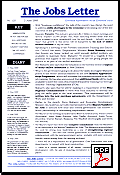



|
 |

|
| No.160 | 31 January 2002 | Essential Information on an Essential Issue |
WHO IS INVOLVED? VOICES EMPLOYERS and the YOUTH EMPLOYMENT CHALLENGE GLOBAL PUSH YOUTH EMPLOYMENT SUMMIT 2002 THE CISCO EXAMPLE  LAST Letter
LAST Letter
NEXT Letter   Download this issue as a PDF file
Index to Features
Project Champions  The Warehouse Group Ltd  City Care Ltd  Money Matters NZ Ltd  Urgent Couriers Ltd
Active Participant
Other Members
“ To involve the business sector means that the third leg of the stool is now in place for our Taskforce. We now have got business groups, community, and central and local government all working together for our youth employment goals. Too often, so many similar initiatives are put in place without the involvement of the business sector. I welcome and applaud their presence ...” — Garry Moore, Mayors Taskforce Chairman and Mayor of Christchurch
“ We believe that there are a number of projects both in the social and environmental that businesses can do to help improve New Zealand in general. This project will obviously improve everything for everybody — including help create better business conditions for our members. The result will be that the companies will get very well trained fine young employees ... and those kids will have jobs. It’s a win/win for all of us.”
“ As a courier company, we employ the age group that the Mayors Taskforce is concerned about — the 18-25 year olds. They are probably 90% of the people working in our industry. So we are asking ourselves: What more can we do to help provide a pathway to employment for young people?
“ As New Zealand's largest company (and one of the biggest employers) we feel we have a key role to play in youth employment. The dairy industry itself is perhaps New Zealand’s most high profile and significant sector, one which continues to grow and provide direct and indirect employment opportunities.
“ From City Care’s perspective, we believe we can put in place some things that will both assist with youth unemployment and also assist our own organisation in getting some young blood into it.
“ The NZBCD shares the Mayors Taskforce vision of addressing unemployment. This issue is extremely important to us because high youth unemployment is not good for business, the economy or the community. In essence, if business actively assists to achieve full youth employment it becomes a virtuous circle of mutual benefit. We can expect member companies to assist in commercialising good ideas of youth entrepreneurs; address the current and looming shortage of trades people; and provide youth internships, apprenticeships and mentoring.
|
 NZ Business Council
NZ Business Council Youth Employment Project BUSINESS BACKING FOR YOUTH GOALThe NZ Business Council for Sustainable Development (NZBCSD), which includes leading companies such as Fonterra, Telecom and the Warehouse, is establishing a Youth Employment Project in which it intends to foster the important role that NZ businesses can take in ensuring employment and training opportunities for all young New Zealanders. The NZBCSD will produce an industry guide on how businesses can help stimulate youth employment, and encourage member companies to commit to and report against local employment or training targets. A website will also be established which will report on progress and share lessons and experience in working towards their youth employment goals. The initiative will be launched at the major annual meeting of the Mayors Taskforce for Jobs to be held in Christchurch on 14-15 February. A project officer will soon be appointed to co-ordinate initial research into the state of youth employment in NZ and to promote the business case for youth employment initiatives. The Council is chaired by Stephen Tindall, Eric Barratt (Managing Director of Sanford Ltd) is Vice Chair, and Dr Rodger Spiller is the Executive Director. The NZBCSD is also part of a global network of national and regional business councils and partner organisations, under the umbrella of the World Business Council for Sustainable Development (WBCSD), based in Geneva, Switzerland. The Council is best known for its advocacy of “triple bottom-line” objectives which aim for healthy economic, environmental and social outcomes from business activities. Their view is that it is important for business to take an active leadership role on social and environmental issues, rather than to simply handing over these responsibilities to local or national government. The Council has been working on several projects which include promoting successful partnerships between business and schools; promoting a debate and influencing policy development around climate change issues; promoting “zero waste” through resource efficiency; distributing a Sustainable Development Reporting Guide for NZ businesses; and encouraging members to support a labelling system that indicates proof of sustainable development practices.  The decision by the NZBCSD to get in behind the Mayors Taskforce and its youth employment goals came after Taskforce chairman and Christchurch Mayor Garry Moore spoke to their AGM last October. The decision by the NZBCSD to get in behind the Mayors Taskforce and its youth employment goals came after Taskforce chairman and Christchurch Mayor Garry Moore spoke to their AGM last October.
Moore: “One of the main objectives of the Taskforce has been to link with imaginative private sector initiatives that are addressing unemployment. The Business Council for Sustainability is one of the few business groups that is really looking at the long-term challenges in front of us — socially, economically as well as environmentally. We are very pleased to be joining in partnership with them so that we can value the good work that can and needs to be done by our young people.”
— The NZ Business Council for Sustainable Development website can be reached at www.nzbcsd.org.nz Sources — interviews with NZBCSD members, Jo Hume NZBCSD Project Manager, Mayors Taskforce for Jobs members, January 2002; NZBCSD website www.nzbcsd.org.nz.GLOBAL PUSH ON THE YOUTH EMPLOYMENT CHALLENGEJean-François Retournard, Director of the ILO Bureau for Employers’ Activities, says: “Youth employment is critical for social and economic stability and growth, apart from all the other good reasons why it is important for society to give it the greatest attention. Employers have been aware of this for a long time, and have in fact been taking initiatives to address the issue individually and through their organizations...” This policy network will draw on “creative leaders in private industry, economic policy and civil society” to explore approaches to the youth employment challenge. The network will formulate a set of recommendations on youth employment which the Secretary-General will propose to world leaders for action. It will also disseminate information on “best practice” youth employment policies and programmes. The policy network draws its mandate from the United Nations Millennium Summit, where Heads of State and Government resolved to “... develop and implement strategies that give young people everywhere a real chance to find decent and productive work.” Jean-François Retournard says that to achieve these goals, everybody who has anything to do with young people and work, including educational institutions, vocational training centres and business support systems, has to be mobilised. Retournard: “The participation of employers is perhaps the most critical of all, since the access of youth to employment depends on their needs and expectations...” Sources — The Secretary General’s Youth Employment Policy Network Concept Paper www.ilo.org/public/english/bureau/exrel/partners/youth.htm; “Meeting the Youth Employment Challenge — a Guide for Employers” International Labour Organisation, Geneva 2001
ILO GUIDE FOR EMPLOYERSThe guide (see extracts in this issue) includes useful case studies and research on international youth employment trends and initiatives. It also offers a checklist of approaches and strategies against which existing national efforts can be assessed.
YOUTH EMPLOYMENT SUMMIT 2002 A Global Alliance for Youth Employment will be launched at a major Summit meeting to be held later this year in Egypt. The Summit will launch a decade-long campaign of action on youth employment — with the aim of creating productive and sustainable livelihoods for an additional 500 million young adults by the year 2012. A Global Alliance for Youth Employment will be launched at a major Summit meeting to be held later this year in Egypt. The Summit will launch a decade-long campaign of action on youth employment — with the aim of creating productive and sustainable livelihoods for an additional 500 million young adults by the year 2012.
This meeting will be held at the legendary Library of Alexandria from 11-16 September, 2002, and will include workshops on innovative policies, practices and strategies for initiating committed action. Half the participants in the conference will be youth or representatives of youth organisations. The other representatives will come from from governments, corporations and diverse non-governmental organisations.  Summit Director Poonam Ahluwalia points out the alarming statistics yet to be faced in our global economy: a billion young people (15-24 years old), eighty-five percent in developing countries, are entering the labour market with few skills and even fewer opportunities for productive work. Summit Director Poonam Ahluwalia points out the alarming statistics yet to be faced in our global economy: a billion young people (15-24 years old), eighty-five percent in developing countries, are entering the labour market with few skills and even fewer opportunities for productive work.
Ahluwalia: “This is a prescription for disaster and social unrest. At the same time we have the knowledge base and connectivity to create opportunities for sustainable livelihoods for the world’s youth. My urgent plea is for a commitment that will allow us to overcome impossible obstacles, and transform our promise to our young into a reality. To do this successfully will require dedicated leadership at all levels of society to work together ...” — Global Youth Employment Summit, Alexandria Egypt, September 2002. More details available from website at www.youthemploymentsummit.org Source — Youth Employment Summit website at www.youthemploymentsummit.orgCISCO NETWORKING ACADEMYCNAP is an interactive, multimedia, self-paced, web-based curriculum which gives a general background in the internet and computer technologies, and teaches specific skills in building and maintaining computer networks. The benefits are immediately obvious: anyone with a Cisco qualification is virtually guaranteed well-paid work amidst the global shortages of IT professionals. In Te Kaha, the Academy is run from a disused school building. There are also training centres at Ruatoria, Te Karaka, South Auckland and Kawerau. Cyberwaka has purchased laptop computers for students to use in the programme. Cisco has contributed about $50,000 to provide internet networking hardware equipment (routers, switchers etc) to connect these computers to the internet, as well as lab equipment, curriculum course content, instructor training and support, and development of the website for students and tutors.
Rikirangi Gage told the recent Social Entrepreneurs conference in Wellington that in the industrial era, Maori in the labour market gravitated towards a narrow range of occupations — those which required brawn and not brains. Gage: “These jobs were also low paid, low skilled, and less secure. In the rapidly developing information society, this situation will simply compound if we don’t intercede. With 63% of our tribe under the age of thirty, the message for our community is simple. We need to get on the right side of the digital challenge and ensure the continuity and wellbeing of the tribe. Our strategy is to leap-frog our people out of the boiling oil of the industrial age by building a relationship with one of the biggest IT companies in the world. The ticket they gain will get them a job anywhere in the world in this industry. It has currency.” — More information on the Cisco Networking Academy Programmes can be found at www.cisco.com/edu/academy Sources — “How a small community connects with the rest of the world” Keynote Speech by Te Whanau CEO Rikirangi Gage to NZ Social Entrepreneurs Conference Wellington November 2001; Cisco networking Academy at www.cisco.com/edu/academy ; profile on Cyberwaka Enterprises at www.nzmis.org.nz/lib/articles/tpk.htm. |